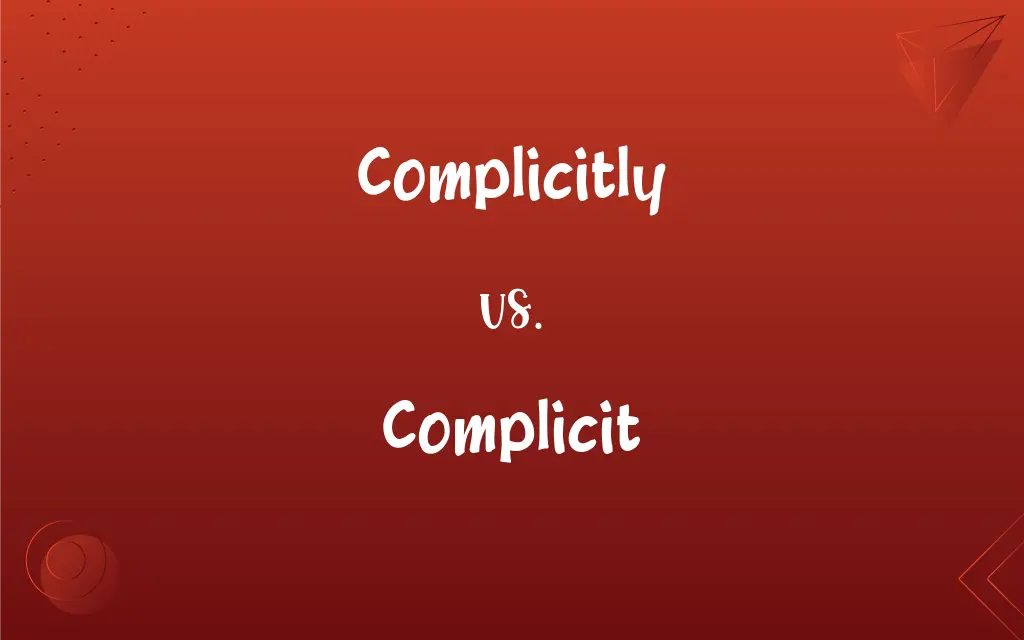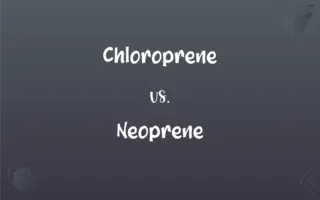Complicitly vs. Complicit: What's the Difference?
Edited by Aimie Carlson || By Harlon Moss || Updated on November 13, 2023
Complicitly refers to the manner of being involved in wrongdoing, whereas complicit means being involved in the wrongdoing itself.

Key Differences
Complicitly is an adverb describing the manner or way in which someone is involved in a wrongful or illegal act. In contrast, complicit is an adjective describing someone who is directly involved in such an act, often implying a shared responsibility.
When someone acts complicitly, they are participating in wrongdoing, often indirectly or subtly. On the other hand, being complicit suggests a more direct involvement or partnership in the wrongful act.
Usage of complicitly often implies a less direct role, perhaps through silence or passive support. Whereas, being complicit often indicates an active or knowing participation in the wrongdoing.
Complicitly can describe actions that contribute to wrongful deeds without being openly involved. In contrast, complicit often connotes a more explicit or acknowledged involvement in such deeds.
Complicitly relates to the manner of involvement in wrongdoing, often indirectly, while complicit directly describes someone as an active participant in the wrongdoing.
ADVERTISEMENT
Comparison Chart
Part of Speech
Adverb, describing how something is done
Adjective, describing a state or characteristic
Degree of Involvement
Often indirect or subtle
Direct and acknowledged
Usage in a Sentence
Modifies a verb to show manner of involvement
Used to describe a person or entity
Implication
Suggests passive or silent support
Implies active or knowing participation
Context of Use
Describing the nature of involvement
Directly labeling someone as involved
ADVERTISEMENT
Complicitly and Complicit Definitions
Complicitly
Being subtly involved in an illegal or immoral action.
They complicitly benefited from the scheme without direct involvement.
Complicit
Participating in a wrongful act, showing shared responsibility.
She was complicit in the conspiracy, actively contributing to the plan.
Complicitly
Showing tacit approval or acceptance of wrongdoing.
The committee acted complicitly by not addressing the complaints.
Complicit
Being a partner or accomplice in unethical or criminal activities.
He was complicit in the cover-up, helping to hide the evidence.
Complicitly
Acting in a way that implies passive support of a wrongful act.
The manager complicitly allowed the unethical practices to continue.
Complicit
Involved with others in an illegal activity or wrongdoing.
The executives were found complicit in the financial fraud.
Complicitly
In a manner that shows silent or indirect involvement in wrongdoing.
He complicitly ignored the rules, turning a blind eye to the misconduct.
Complicit
Sharing the guilt or blame in a wrongful act.
The group was found complicit in violating environmental regulations.
Complicitly
Involvement in a wrongful act by omission or silence.
The bystanders remained complicitly silent during the unfair treatment.
Complicit
Showing involvement and agreement in questionable actions.
The supervisor was complicit in the harassment, doing nothing to stop it.
Complicitly
In a complicit manner.
Complicit
Associated with or participating in a questionable act or a crime; having complicity
"Presidential handlers and a complicit press corps managed to suppress public awareness" (Andrew P.N. Erdmann).
Complicit
Associated with or participating in an activity, especially one of a questionable nature.
FAQs
What does complicitly imply in behavior?
It implies indirect or subtle involvement in wrongdoing.
Can someone be complicit in a crime?
Yes, being complicit means directly participating in a crime or wrongdoing.
Can someone be wrongly labeled complicit?
Yes, someone can be wrongly accused of being complicit in a crime or wrongdoing.
Is complicitly always intentional?
It can be either intentional or unintentional, implying indirect involvement.
Is complicitly used in legal contexts?
It's less common in legal contexts, compared to complicit.
Does complicitly involve active participation?
Not necessarily, it often refers to passive or silent involvement.
Is complicit a judgmental term?
Yes, it carries a negative connotation, implying guilt or wrongdoing.
Can a company be complicit in a scandal?
Yes, a company can be labeled complicit if it is involved in the scandal.
Can complicit refer to positive involvement?
No, it almost always refers to involvement in negative or wrongful actions.
Can complicit be used in corporate ethics?
Yes, it's often used to describe unethical corporate behavior.
Does complicitly mean the same as complicity?
No, complicitly is an adverb, while complicity is a noun referring to the state of being involved in wrongdoing.
Are there synonyms for complicitly?
Synonyms include indirectly, tacitly, or passively.
How is complicit used in a sentence?
It's used as an adjective, e.g., "He was complicit in the fraud."
Can complicitly refer to a group's actions?
Yes, it can describe the manner in which a group is involved in wrongdoing.
Can complicitly imply a moral dilemma?
Yes, it can suggest a moral conflict in choosing to be silently involved.
Is complicitly a common term in everyday language?
It's less common and more specific compared to complicit.
Can complicit imply legal responsibility?
Yes, it can imply legal culpability in a crime or illegal action.
Does complicitly require direct action?
No, it often refers to indirect involvement or silent approval.
Does complicit always involve multiple parties?
Often, but not necessarily; one can be complicit with others or with a system.
Is being complicit a crime?
Depending on the context, being complicit in a crime can be legally punishable.
About Author
Written by
Harlon MossHarlon is a seasoned quality moderator and accomplished content writer for Difference Wiki. An alumnus of the prestigious University of California, he earned his degree in Computer Science. Leveraging his academic background, Harlon brings a meticulous and informed perspective to his work, ensuring content accuracy and excellence.
Edited by
Aimie CarlsonAimie Carlson, holding a master's degree in English literature, is a fervent English language enthusiast. She lends her writing talents to Difference Wiki, a prominent website that specializes in comparisons, offering readers insightful analyses that both captivate and inform.
































































